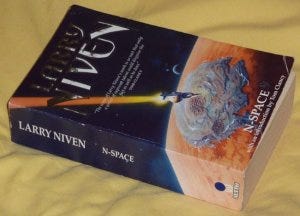N-Space, a Larry Niven collection

I couldn't quite tell who this collection was aimed at. There's a very long introduction with quotes and comments on Niven's work by other writers, so much in fact that I wondered (knowing nothing about him) if this 1990 collection had been released as a retrospective on his death, but no - as far as I can ascertain he's still out there writing. Then comes a long prologue from Niven himself which rambles entertainingly enough through anecdotes and background, but a lot of references are lost on the newcomer. These chatty introductions precede almost every story and excerpt in the book, giving background and insight for the fan. But if you're already a fan, why would you want excerpts (several pages at a time) from 5 of his novels? And if you're not a fan already why would you want to read 5 lengthy, out of context excerpts from the middle of his novels? I skipped those - I'd like to read more Larry Niven after this, and I didn't want to stumble over any spoilers.
That still left 20-odd shorter pieces that are mostly well worth a read if you've often read Philip K Dick and longed for solid, nuanced characters and something closer to lyrical prose (not that that's always lacking in PKD, but usually the plot comes first by a long way). I'll mention a few of my favourites here:
All the Myriad Ways falls under the sub-genre that's fast becoming my favourite: alternate history/alternative timeline crime. A series of inexplicable and apparently random crimes are giving Detective-Lieutenant Trimble a headache. He thinks solving them will make him feel better, but as the pieces slot into place he's no longer so sure about that. Gripping, well-written, a neat idea and great style for the ending. This story had sparked off an idea of my own before I'd read more than a couple of pages (then I got worried that all I'd done was semi-predict how All the Myriad Ways would turn out, but it's OK, it seems I'm not that smart).
For a Foggy Night is another multiple timeline story but with a completely different feel from All the Myriad Ways. Always thought fog was just water droplets in the air? Think again.
The Meddler apparently started life as a satire on the likes of Mickey Spillane. The result is a hard-boiled private eye trying to deal with a meddling alien who can't quite bring himself to observe quietly from the sidelines. Interesting idea, fun to read but also thought-provoking.
The Fourth Profession was, in my opinion, one of the best examples of Niven's well-drawn characters. A bartender, a travelling alien detached from his compatriots who are in diplomatic talks, pills that give knowledge or 'train' someone for a particular job, a potential international incident - those are the basic ingredients but of course there's more to it than that. Well-judged detail and properly tense in the right places.
I'd just read Inconstant Moon when the recent solar flare was in the news, which added a slight thrill (and some shared graveyard humour with OneMonkey, who read this a while ago). What do you do when your scientific training lets you read all the signs that seem to point to the end of the world? What would you do if you thought this was it? And what difference might it make if you keep your head when all around you are losing theirs?
Night on Mispec Moor seems like a straight fantasy/horror story, but then comes the internal logic of the local science and all is rationally explained and dealt with.
Flare Time. The nuisance of travel writers, and the need for tourism in backwater planets. Wonderfully imagined and described flora and fauna; I was practically standing among it all.
Brenda was another story with some great character depth. I would say it's about the passage of time, redemption, and how you shouldn't condemn someone because of what they're born into.
The Kiteman felt like a part of something bigger, and like many of Niven's works it's set in the same world as one (or more?) of his novels. The world felt solidly set-up and I want to revisit; the story itself focuses on a man (daring or mad, depending who you ask) who uses a system of kites to fly around outside the home-tree (and if necessary, between trees), and is teaching the skill to a few of the younger generation when their abilities are tested in a sudden emergency.
This book is a chronological, for the record, whole output catalogue, including essays, lists, outlines and a never-published prologue. If N-Space is in your local library or you see it going cheap, it's worth picking up but other collections might give you more entertainment for your money if, like me, you don't necessarily want to know where or when a story was written, who gave him the idea or how many false starts it took to complete it.


